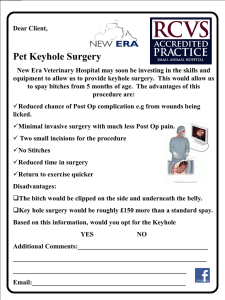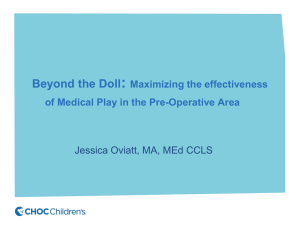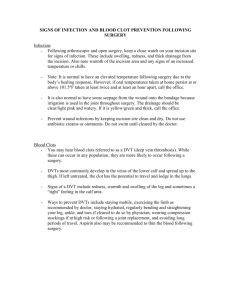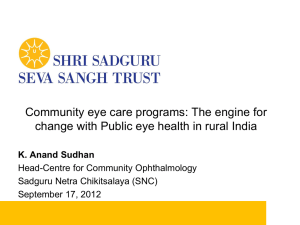Preparing for your anesthesia and surgery
advertisement
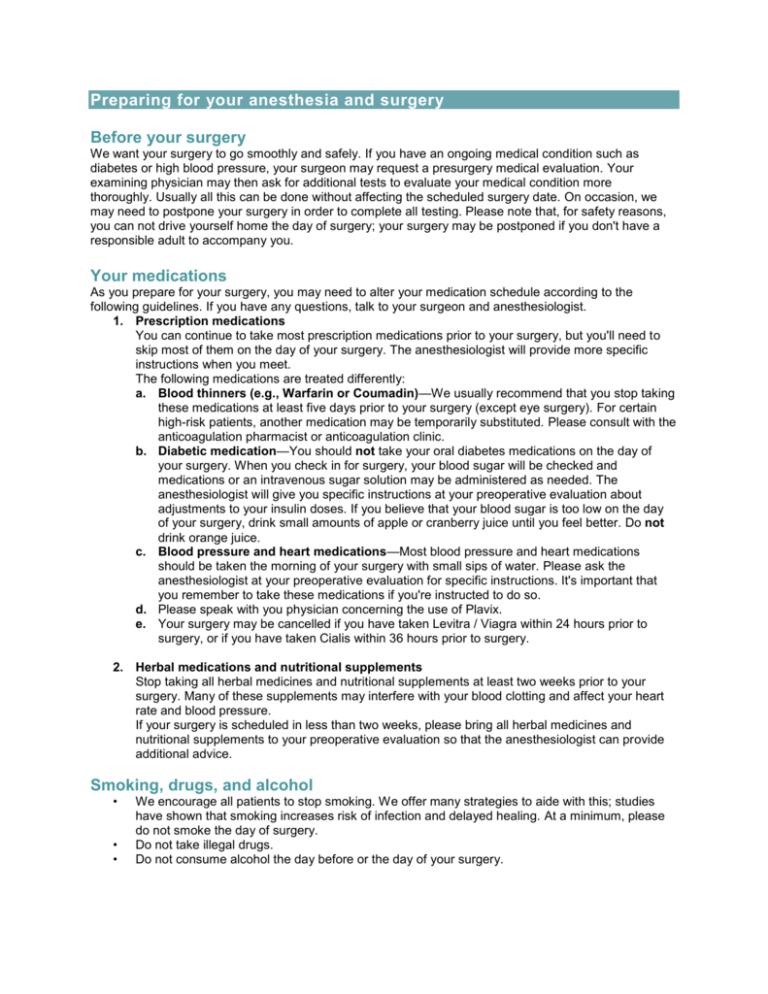
Preparing for your anesthesia and surgery Before your surgery We want your surgery to go smoothly and safely. If you have an ongoing medical condition such as diabetes or high blood pressure, your surgeon may request a presurgery medical evaluation. Your examining physician may then ask for additional tests to evaluate your medical condition more thoroughly. Usually all this can be done without affecting the scheduled surgery date. On occasion, we may need to postpone your surgery in order to complete all testing. Please note that, for safety reasons, you can not drive yourself home the day of surgery; your surgery may be postponed if you don't have a responsible adult to accompany you. Your medications As you prepare for your surgery, you may need to alter your medication schedule according to the following guidelines. If you have any questions, talk to your surgeon and anesthesiologist. 1. Prescription medications You can continue to take most prescription medications prior to your surgery, but you'll need to skip most of them on the day of your surgery. The anesthesiologist will provide more specific instructions when you meet. The following medications are treated differently: a. Blood thinners (e.g., Warfarin or Coumadin)—We usually recommend that you stop taking these medications at least five days prior to your surgery (except eye surgery). For certain high-risk patients, another medication may be temporarily substituted. Please consult with the anticoagulation pharmacist or anticoagulation clinic. b. Diabetic medication—You should not take your oral diabetes medications on the day of your surgery. When you check in for surgery, your blood sugar will be checked and medications or an intravenous sugar solution may be administered as needed. The anesthesiologist will give you specific instructions at your preoperative evaluation about adjustments to your insulin doses. If you believe that your blood sugar is too low on the day of your surgery, drink small amounts of apple or cranberry juice until you feel better. Do not drink orange juice. c. Blood pressure and heart medications—Most blood pressure and heart medications should be taken the morning of your surgery with small sips of water. Please ask the anesthesiologist at your preoperative evaluation for specific instructions. It's important that you remember to take these medications if you're instructed to do so. d. Please speak with you physician concerning the use of Plavix. e. Your surgery may be cancelled if you have taken Levitra / Viagra within 24 hours prior to surgery, or if you have taken Cialis within 36 hours prior to surgery. 2. Herbal medications and nutritional supplements Stop taking all herbal medicines and nutritional supplements at least two weeks prior to your surgery. Many of these supplements may interfere with your blood clotting and affect your heart rate and blood pressure. If your surgery is scheduled in less than two weeks, please bring all herbal medicines and nutritional supplements to your preoperative evaluation so that the anesthesiologist can provide additional advice. Smoking, drugs, and alcohol • • • We encourage all patients to stop smoking. We offer many strategies to aide with this; studies have shown that smoking increases risk of infection and delayed healing. At a minimum, please do not smoke the day of surgery. Do not take illegal drugs. Do not consume alcohol the day before or the day of your surgery. Pre-op education The surgery scheduler will provide you with the educational information you will need for your procedure. What to do the week before your surgery We understand the time leading up to surgery can be a busy time for you. However, it's important to take care of the following items the week before your surgery. (Consult your physician if there is anything that you don't understand.) 1. See your surgeon for a pre-op visit one day to two weeks before your surgery. We'll schedule an appointment for you. 2. Visit our Pre-op Center on the third floor for your pre-op assessment by an anesthesiologist. Assessments are done as walk-in appointments on the same day as your pre-op visit, Monday through Friday, from 9 a.m. to 12 p.m. and 1:30 to 4 p.m. 3. Go to our EKG Department on the second floor if your surgeon or anesthesiologist ordered an EKG. This can also be done as a walk-in appointment on the same day as your pre-op visit. 4. Go to the lab in the basement to complete any lab tests ordered by your surgeon or anesthesiologist. 5. Go to our Preadmitting Department to pay any charges* you may owe for your surgery. 6. Make transportation arrangements with a friend or relative for the day of your surgery. *If you have any questions about your charges, contact our Member Service Call Center at 1-800-4644000 or 1-800-777-1370 (TTY for the deaf, hard of hearing, or speech impaired), weekdays from 7 a.m. to 7 p.m. and weekends from 7 a.m. to 3 p.m. Disability insurance If you want to apply for state disability insurance, stop by the Insurance Department in the basement of our West Los Angeles Medical Center to obtain the necessary paperwork. If you have questions about this process, please call 323-857-2751, Monday through Friday, from 9 a.m. to 5 p.m. What to do the day before your surgery To be fully prepared for your surgery, it is important that you follow these day-before instructions. (Consult your physician if there is anything you don't understand.) • • • • • • • • • Don't eat or drink anything after midnight, including water (unless instructed otherwise by the anesthesiologist). For infants, parents or guardians should follow any instructions the anesthesiologist may have provided. Take medications with small sips of water if advised to do so by your surgeon or the anesthesiologist. Prepare a list of your current medications, including over-the-counter drugs (with the dosage and frequency), to bring with you to the hospital. Wash your hair and bathe. Do not wear makeup or skin cream, ointment, or lotion of any kind the day of surgery. Remove fingernail and toenail polishes. Please do not wear nail polish if having hand or foot surgery. Confirm your transportation arrangements to and from the medical center. Please note that, for safety reasons, if you do not have a responsible adult to accompany you, your surgery may be postponed. Make sure you've filled any prescriptions that you were given during your pre-op visit. If you need to cancel your surgery for any reason, call our cancellation hotline at 323-857-2800. (Continued) What to do on the day of your surgery There's a lot you can do to help your surgery day proceed as smoothly as possible. Please remember to take care of the following before you arrive for your surgery. • • • • • • • • • • • • • Bring your Kaiser Permanente ID card and a picture ID with you to the medical center. Don't eat or drink anything (unless instructed otherwise by the anesthesiologist or your surgeon). You may brush your teeth (be sure to rinse thoroughly), but don't swallow any water. On the day of surgery, bathe/shower using soap and water only, unless you receive special instruction from your surgeon. Remove (and do not reapply) lotions, creams, makeup, perfumes/cologne, powder, deodorant, or any petroleum-based product. Don't wear any jewelry (including body piercings) or hairpins. Please wear your hair down, free of any hair accessories. Dress simply, and wear clothing that can be easily removed. Bring your prepared list of current medications. Bring a book or magazine to read in case your surgery is delayed. Bring only enough money for your copayment or other charges (unless you paid it during your preadmission visit) and for any prescriptions you may need after surgery. Give yourself plenty of time to arrive. Check in for your surgery two hours before your surgery is scheduled. Your surgery scheduler will instruct you ahead of time to check in on the third floor at either the Pre-op Center reception desk or the West Tower reception desk. We cannot be responsible for loss of or damage to personal articles. For your own protection, please don't bring any valuables such as cell phones, laptops, iPads, excessive amounts of cash, jewelry, credit cards, or keys with you, unless you have someone responsible to leave them with while you are in surgery. Keeping you safe Your safety is a priority for all our physicians and staff at the West Los Angeles Medical Center. During your surgical experience, we may ask you repeatedly for information such as your name, any allergies you may have, and the procedure you're having done. We do this to help ensure your safety. Your surgery site may be marked with a skin marker as an additional safety precaution. Just prior to the start of your surgery, all members of the surgical team will conduct a safety briefing to verify critical information, including: • • • • the patient's name and date of birth. the surgical procedure. the surgical side/site. the medical record number. Your operating room and recovery room experience When you arrive at our Pre-op Center, a nurse will take you to the preoperative area and ask you to change into a gown. The nurse will put your ID bracelet on your wrist, check your vital signs, and start an intravenous drip in your arm. The anesthesiologist and certified registered nurse anesthetist will meet with you before you enter the operating room and answer any last-minute questions you may have. You'll be connected to monitoring devices and given medication that will make you drowsy. Once you enter the operating room, your surgical team will try to make you feel as comfortable as possible. The waiting experience for your family and friends Some of your family and friends may choose to accompany you on the day of your surgery. The information below may be helpful to them while they are waiting for you. You may provide the cell phone number for one friend or relative. Your physician and surgical team will use the number if they need to talk to them or if there is new information about your surgery. • • • • • • • • Your relative or friend can get an update on the status of your surgery by asking the receptionist in the Pre-op Center area or by calling the Recovery Room at 323-857-2377 (east tower) or 323857-3372 (west tower). A cafeteria and vending machine area are available in the basement (east tower) for refreshments and meals. Vending machines are also located on the third floor (east tower), Surgery Waiting Area, Room 339. A gift shop on the first floor (east tower) is open Monday through Friday, from 9 a.m. to 6:30 p.m., for snacks and other shopping. The gift shop is closed on weekends and major holidays. A Healthy Living store on the first floor (west tower) is open Monday through Friday, from 9 a.m. to 6:30 p.m., for snacks and other shopping. The gift shop is closed on weekends and major holidays. You may want to ask your friend or relative to pick up any prescriptions from the hospital pharmacy before you go home. Your friend or relative can pick up prescriptions for you with your Kaiser Permanente ID card. When you are discharged from the hospital, your friend or relative can pick you up at the main entrance near the 24-hour pharmacy. Adult patients must wait at least one hour after surgery to have visitors. After that, you may have one visitor in the recovery room for a few minutes at the discretion of the recovery room nursing staff. Pediatric patients up to 14 years of age may have one parent or guardian with them in the recovery room at the discretion of the recovery room nursing staff. Returning home Please arrange for someone to drive you home from the medical center. After returning home, you can help your recovery by: • • • • Following your physician's instructions about the amount of physical activity you should have. Keeping any follow-up appointments your physician has scheduled. Taking medications as instructed by your surgeon. Not smoking and avoiding secondhand smoke. If you have any questions or experience any problems after returning home, contact your physician immediately. We wish you a speedy recovery and good health!


